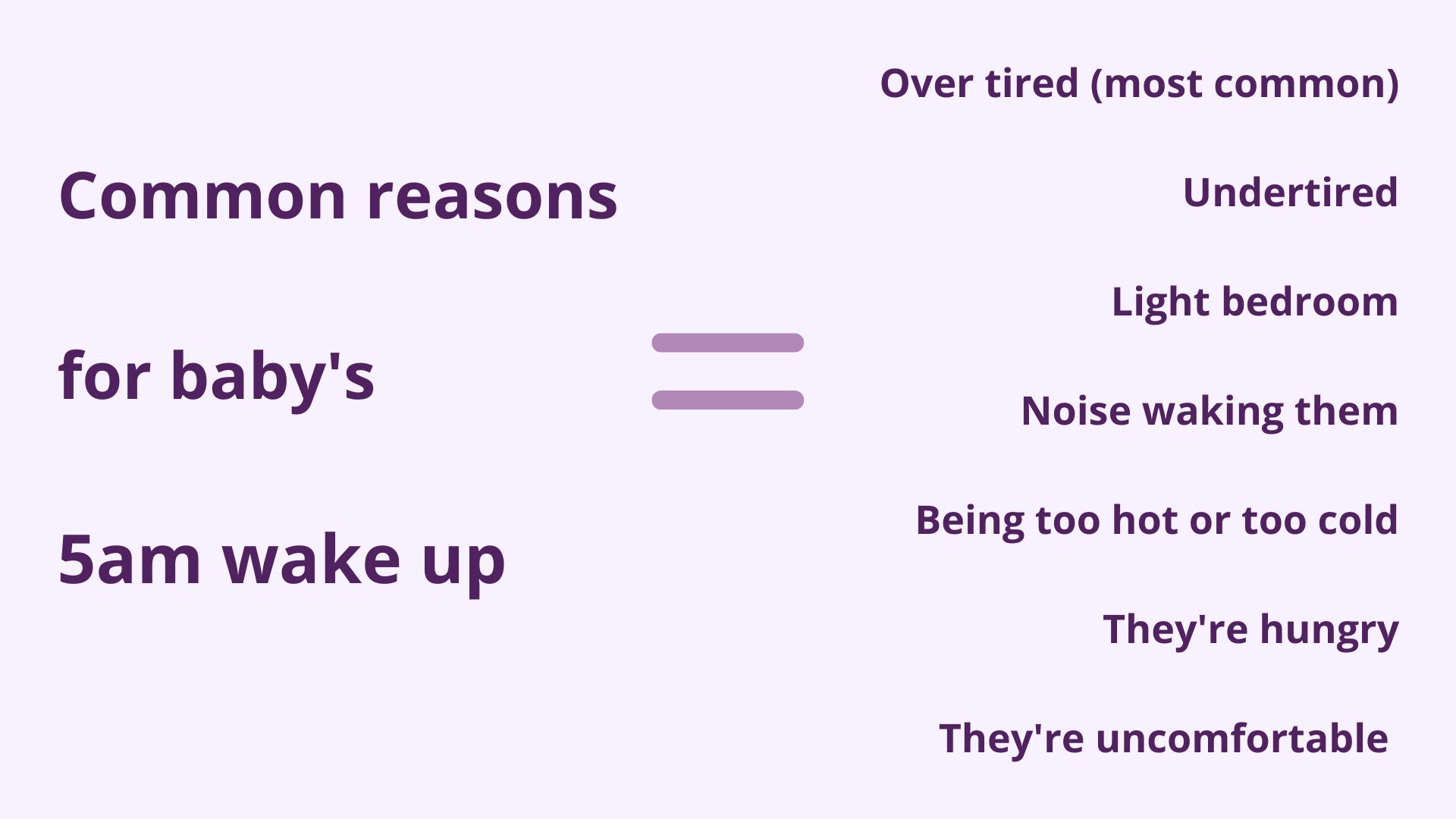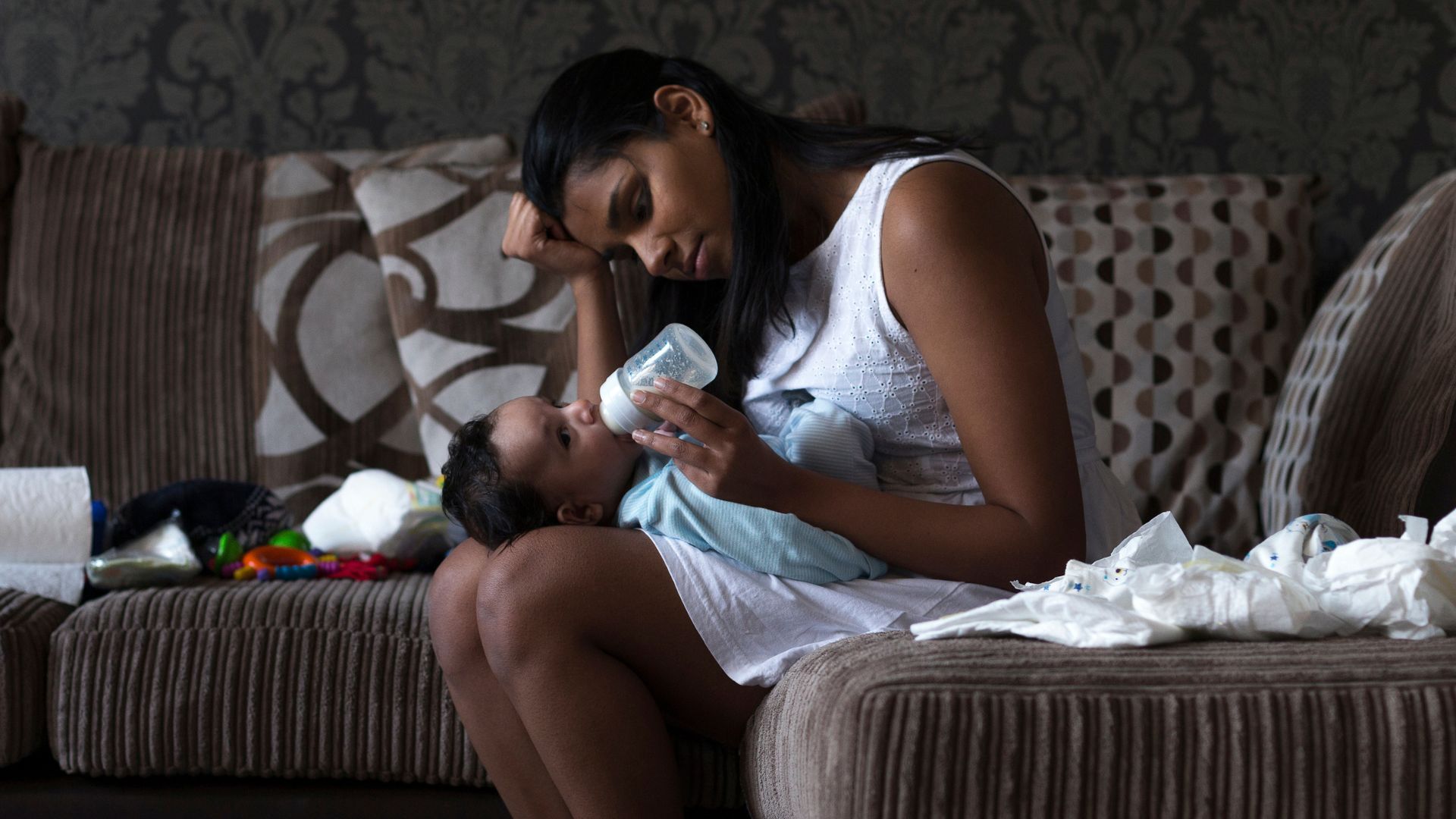Baby waking at 5am? We ask a baby sleep expert reasons why and what you can to do stop it
Baby waking at 5am means a really long day for some parents, but there are ways to help your baby get back to sleep

As parents, you're not doing anything wrong, and your baby isn't 'broken' if they wake up early or don't sleep through the night - it's totally normal. 'Baby waking at 5am' is a hugely Googled phrase, so know that you're not alone in this exhausting challenge.
Your little one might be going through one of the sleep regression ages, such as the 10-month sleep regression or the 4-month sleep regression. Or, they might just be a naturally early riser, regardless of whether you've chosen to baby sleep train or not.
Finding the right cot mattress to keep your baby comfortable or the cosiest sleeping bag to keep them perfectly warm could help. Your baby's cot bed position, whether it's near a draughty window or in the right spot in the room, might also play a role in their sleep patterns. But all babies are different, and it can be hit and miss. The main thing to remember is that waking up early and not sleeping through the night is normal for babies.
Sarah Patel, Baby & Toddler Sleep Consultant, tells us, "Waking at 5am is hard, especially if parents are working. One of the best ways to help regulate your baby’s circadian rhythm is to get outside in the fresh air as much as possible. Not only is it great for them, but it will also help you feel less tired.”
Here we talk through the reasons why your baby might be waking at 5am and what you can put in place to help them stay settled for longer.
Baby waking at 5am
If your baby is waking at 5am it's likely that they are still tired, or might have been put down when they were over tired. We know this is not the ideal answer, as with most things to do with babies it's never clear cut or an easy 'do this' fix. It could be for many reasons like impending sickness, teething, or development. However, if it's happening regularly it's more likely to be to do with sleep patterns, overtiredness and/or daytime naps.
If your baby doesn't go back to sleep, either after a feed or by self-soothing, then it can mean your baby is waking too early. It’s all to do with their circadian rhythm. Once up for the day, you might notice that they can barely make it 2 hours of awake time before they need a nap. If you are putting them down before 8am for a nap, that first nap of the day is essentially what should have been continued nighttime sleep.
Parenting advice, hot topics, best buys and family finance tips delivered straight to your inbox.
Mum-of-one, Steph remembers this, "I felt so out of control when this happened to Rosa. I just didn't know what to do, I had no plan. So I was just starting the day at 5am, hoping it would change. In hindsight, my daughter needed me to make the decisions."
Your baby waking too early can be down to many factors, such as age, development stage, and the time they go to bed. If your baby is waking at 5am, going back down for a nap by 8am, and getting cranky in the afternoons, this could indicate that they need to sleep past 5am. It's an expectation that babies wake between 6am and 7am, though it can vary widely. Things like teething, sickness, sleep regressions, and other outside influences can also come into play, especially if your baby suddenly starts waking up earlier than usual.

Reasons my baby could be waking at 5am?
A baby waking up too early can be a paradoxical sign - it could mean they're overtired, or it could mean they're getting too much sleep overall. At 6 months old, a baby typically needs around 12 to 15 hours of sleep over a 24-hour period, which might look like 10 to 12 hours at night and 3 to 5 hours during the day split into two or three naps. However, this isn't a hard rule, and just when you think you've figured it out, they may shift those tiny goalposts on you. The key is to pay close attention to your baby's individual sleep needs and cues, as they can vary greatly from standard recommendations or from one baby to the next.
Baby sleep expert and mum-of-two Sarah Patel says, "This time of the morning is challenging for babies as their sleep cycles are light", explains Sarah. "If they wake up at 5am and are showing signs they want to get back to sleep but can't, offer them all the support you can.”
Sarah explains what this support could look like:
- Reacting quickly and quietly
- Feeding them back to sleep
- Rocking them back to sleep
- Bringing them into your bed (if this is safe)
What can cause early morning waking in babies?
Again, it can be 101 things, though the most common cause of early wakings is a bedtime that is too late. Over-tired leads to poor quality sleep, including premature wakings. While many believe it does, many experts, including Sarah Patel will tell you that "a later bedtime does not equate to a later morning wake time."
If a feed, nappy change or cuddle doesn’t send baby back off then its likely to be one of these reasons;
- Overtired (most common)
- Undertired
- Light coming into the room
- Noise waking them
- Being too hot or cold
- Hunger
- Uncomfortable

What to do if my baby is waking at 5am?
If your baby wakes up early every morning, you can try a number of things, from adjusting their nap schedules and keeping their room dark with a blackout blind to establishing a consistent bedtime routine. However, be prepared for the dreaded sleep regressions!
While it might be tempting to let them cry if they wake too early, it's unlikely to ever result in them falling back to sleep. "This is because at this time in the morning they will be going through much shorter and lighter sleep cycles," says Sarah. This makes it much harder for them to get themselves back to sleep."
Instead, when you go to see your baby, treat it as if it’s a midnight visit. Keep the lights low and noise to a minimum while you settle them, change their nappy or give them a feed, then put them back down to see if they'll drift off again. If they don’t settle, it looks like you’re starting your day at 5am.
If this does happen, try not to worry too much about it. Sarah suggests trying an early morning nap before 8am (for you and your baby). "This might help to re-jig your baby's circadian rhythm (internal body clock) and avoid the 5am starts becoming a pattern."
Take a look at their sleep schedule to make sure they’re getting enough sleep overall. It sounds counterintuitive, but a baby who is too tired won’t be able to sleep well.
An ideal bedtime for infants is 7/730pm. If your baby currently goes to bed later than this, try putting them down to sleep earlier in the evening, do this by gradually moving up their bedtime by 10 minutes each night, and see if that helps them stay asleep longer. Don’t expect results immediately. Give it a solid week or two before you decide whether this trial was successful.
On the flip side, if too much sleep is the culprit behind your baby waking too early, you may have to try the opposite tactic. Move their bedtime later by about 10 minutes each night until they’re hitting the hay about an hour later (or you reached your goal of them sleeping later). This works best if you move your baby’s eating schedule later as well, so hunger doesn’t wake them up too soon.
You may also consider gradually reducing nap length or pushing a morning nap a little later each day to help push back wake-up time.
Featured expert

Sarah Patel is the founder of Teach To Sleep, which helps parents to support their baby's and toddler's sleep. She is a certified sleep consultant for babies and young children and has a PGCE in Primary Education, a BSC in Cognitive Science, and an MA in Education.
If you're still at the end of your tether with baby sleep, take a look through our tried and tested baby sleep aids or our in-depth articles on baby sleep training, and also find out whether or not it's a sleep regression you're dealing with.
Stephanie has been a journalist since 2008, she is a true dynamo in the world of women's lifestyle and family content. From child development and psychology to delicious recipes, interior inspiration, and fun-packed kids' activities, she covers it all with flair. Whether it's the emotional journey of matrescence, the mental juggling act of being the default parent, or breaking the cycle of parenting patterns, Stephanie knows it inside out backed by her studies in child psychology. Stephanie lives in Kent with her husband and son, Ted. Just keeping on top of school emails/fundraisers/non-uniform days/packed lunches is her second full-time job.